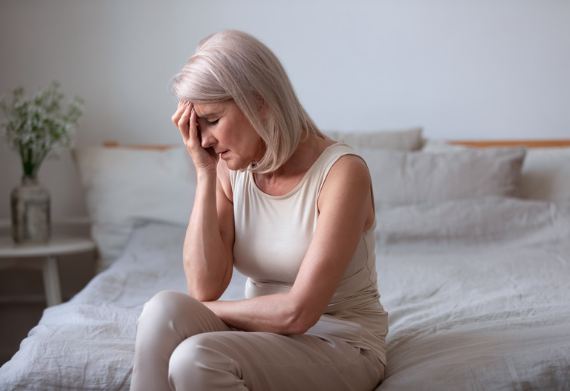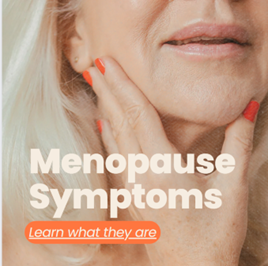Dealing With Menopause Problems
Dealing With Menopause Problems –
Symptoms and Solutions :
As you age, you may experience various changes in your body, including menopause. Menopause is a natural biological process that marks the end of your menstrual cycle. It typically occurs between the ages of 45 and 55 but can happen earlier or later. During this time, your body undergoes significant hormonal changes that can cause a range of symptoms. Dealing with menopause problems – all of the unexpected, can be very difficult!
Some common symptoms of menopause include hot flashes, night sweats, vaginal dryness, mood swings, and sleep disturbances. These symptoms can significantly impact your quality of life and make it challenging to carry out your daily activities. While menopause is a natural process, it’s essential to seek medical attention if you experience severe symptoms that affect your physical and emotional well-being. Your doctor can help you manage your symptoms and improve your overall health during this transition.
Understanding and Dealing With Menopause Problems
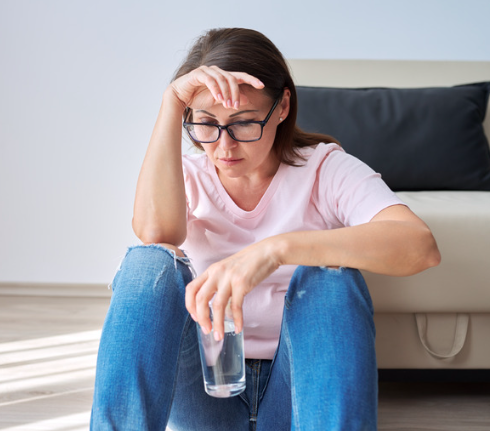 What is Menopause?
What is Menopause?
Menopause is a natural biological process that marks the end of a woman’s menstrual cycle. It is diagnosed when a woman has gone without a menstrual period for 12 consecutive months. Menopause usually occurs between the ages of 45 and 55, but it can also happen earlier or later.
Causes of Menopause Problems
During menopause, the body undergoes significant hormonal changes that can cause a range of symptoms and health problems. Some of the most common menopause problems include:
- Hot flashes and night sweats
- Mood changes, including irritability, anxiety, and depression
- Vaginal dryness and discomfort during intercourse
- Sleep problems, including insomnia and sleep apnea
- Weight gain and slowed metabolism
- Thinning hair and dry skin
- Loss of breast fullness
- Digestive problems, including bloating, constipation, and acid reflux
- Weaker bones with reduced mass and strength
RELATED ARTICLES:
Best Hair Loss Treatments for Females
The Keto Diet For Beginners
Women’s Breast Health Information
Early menopause symptoms can also occur in some women, which can include irregular periods, hot flashes, and mood changes. If you experience any of these symptoms, it is important to talk to your doctor to rule out any underlying health issues.
Menopause problems can be managed with lifestyle changes, such as regular exercise, a healthy diet, and stress reduction techniques. Hormone therapy and other medications can also be effective in treating menopause symptoms. Your doctor can help you determine the best course of treatment for your individual needs.
In conclusion, menopause is a natural process that can cause a range of symptoms and health problems. By understanding the causes of menopause problems and seeking appropriate treatment, you can manage your symptoms and improve your overall health and well-being.
Common Menopause Symptoms
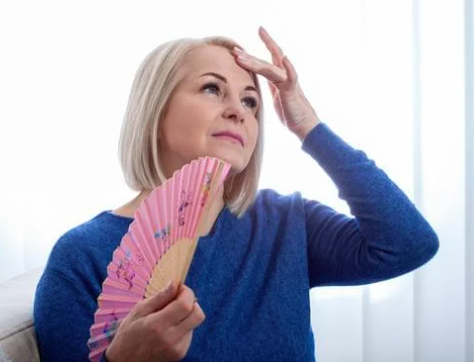 As you approach menopause, you may experience a range of symptoms that can affect your daily life. Here are some of the most common symptoms you may experience during this time:
As you approach menopause, you may experience a range of symptoms that can affect your daily life. Here are some of the most common symptoms you may experience during this time:
Hot Flashes
Hot flashes are one of the most common symptoms of menopause. They can cause sudden feelings of warmth, sweating, and flushing, especially in the face, neck, and chest. Hot flashes can last for a few seconds to several minutes and can occur several times a day.
Sleep Problems
Many women experience sleep problems during menopause. You may have trouble falling asleep or staying asleep, and you may wake up feeling tired. Natural remedies like practicing good sleep hygiene, avoiding caffeine and alcohol, and establishing a regular sleep schedule can help alleviate sleep problems.
Emotional Symptoms
Menopause can also cause emotional symptoms, such as mood swings, irritability, and anxiety. These symptoms are often caused by changes in hormone levels and can be managed through self-care, such as regular exercise, stress management techniques, and talking to a therapist.
Breast Pain
Breast pain is a common symptom of menopause, and it can be caused by hormonal changes. You may experience tenderness, swelling, or aching in your breasts. Wearing a supportive bra and taking over-the-counter pain relievers can help alleviate breast pain.
Headache
Menopause can also cause headaches, including migraines. These headaches can be caused by hormonal changes, stress, or changes in sleep patterns. Over-the-counter pain relievers and relaxation techniques can help alleviate headache symptoms.
Dizziness
Dizziness is another common symptom of menopause. It can be caused by changes in hormone levels, changes in blood pressure, or changes in the inner ear. Staying hydrated, avoiding sudden movements, and practicing relaxation techniques can help alleviate dizziness.
 Joint Pain
Joint Pain
Many women experience joint pain during menopause. This can be caused by hormonal changes or changes in activity levels. Regular exercise, maintaining a healthy weight, and taking over-the-counter pain relievers can help alleviate joint pain.
Overall, menopause symptoms can be managed through self-care, lifestyle changes, and medical treatments. If you are experiencing severe or persistent symptoms, it is important to talk to your doctor to determine the best course of treatment for you.
RELATED ARTICLE:
How to Cure Rheumatoid Arthritis Permanently
Treatment Options for Menopause Symptoms
If you are experiencing menopause symptoms, there are several treatment options available to help alleviate your discomfort. Here are some of the most common treatments:
Hormone Replacement Therapy
Hormone replacement therapy (HRT) is a treatment that involves taking estrogen and progesterone to replace the hormones that your body is no longer producing. HRT is effective in treating hot flashes, vaginal dryness, and other symptoms of menopause. However, it is not recommended for women who have had breast cancer or other hormone-sensitive cancers, as it may increase the risk of cancer recurrence.
Natural Remedies
There are several natural remedies that can help alleviate menopause symptoms. Some of the most popular remedies include:
- Black cohosh: This herb has been shown to reduce hot flashes and other symptoms of menopause.
- Soy: Soy contains phytoestrogens, which are plant compounds that mimic the effects of estrogen in the body. Eating soy products may help alleviate hot flashes and other symptoms.
- Flaxseed: Flaxseed contains lignans, which are plant compounds that have estrogen-like effects. Eating flaxseed may help alleviate hot flashes and other symptoms.
Lifestyle Changes
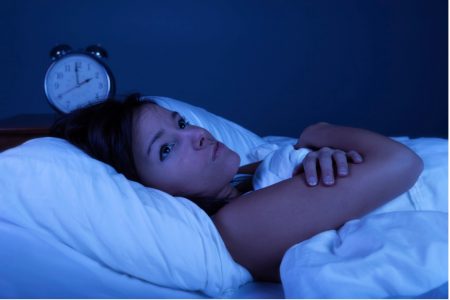 Making certain lifestyle changes can also help alleviate menopause symptoms. Here are some changes you can make:
Making certain lifestyle changes can also help alleviate menopause symptoms. Here are some changes you can make:
- Exercise regularly: Regular exercise can help reduce hot flashes and other symptoms of menopause.
- Eat a healthy diet: Eating a diet rich in fruits, vegetables, and whole grains can help alleviate menopause symptoms.
- Get enough sleep: Getting enough sleep can help reduce hot flashes and other symptoms of menopause.
In conclusion, there are several treatment options available to help alleviate menopause symptoms. Hormone replacement therapy, natural remedies, and lifestyle changes are all effective in reducing hot flashes, vaginal dryness, and other symptoms. Consult with your doctor to determine which treatment option is best for you.
Dealing With Menopause Problems:
Menopause Symptoms and Periods
When you enter menopause, your menstrual periods will eventually stop. However, before they completely stop, you may experience irregular periods. This is because your hormone levels are fluctuating, causing your menstrual cycle to become unpredictable. You may also experience other symptoms during this time, such as:
- Hot flashes
- Night sweats
- Mood changes
- Vaginal dryness
- Decreased sex drive
- Insomnia
These symptoms can be uncomfortable and disruptive to your daily life. Hot flashes, in particular, can be very bothersome. They can cause a sudden feeling of warmth or heat, followed by sweating and chills. Hot flashes can occur at any time of the day or night and can last for several minutes.
Irregular periods during menopause can also be frustrating. You may experience heavier or lighter bleeding than usual, or your periods may last longer or shorter than usual. Some women may even skip periods altogether.
It’s important to note that irregular periods during menopause can increase your risk of endometrial cancer. This is because the lining of your uterus may become thicker due to irregular bleeding. If you experience any unusual bleeding or spotting during menopause, it’s important to see your doctor right away.
In summary, menopause can cause a variety of symptoms, including irregular periods. These symptoms can be uncomfortable and disruptive, but there are treatments available to help manage them. If you’re experiencing any symptoms of menopause, talk to your doctor about your options.
Other Menopause Symptoms to Watch For
As you approach menopause, you may experience a range of symptoms that can impact your quality of life. In addition to hot flashes and night sweats, there are other symptoms you should be aware of. Here are two other common menopause symptoms to watch for:
Nausea
Nausea is a common symptom of menopause that can be caused by hormonal changes. It can be mild or severe and may be accompanied by vomiting. If you experience nausea during menopause, there are several things you can do to alleviate your symptoms:
- Eat small, frequent meals throughout the day
- Avoid spicy or greasy foods
- Stay hydrated by drinking plenty of water
- Try ginger tea or ginger supplements, which can help reduce nausea
If your symptoms are severe or persist, talk to your healthcare provider about other treatment options.
Depression
Depression is another common symptom of menopause that can be caused by hormonal changes. It can be characterized by feelings of sadness, hopelessness, and loss of interest in activities you once enjoyed. If you experience depression during menopause, there are several things you can do to manage your symptoms:
- Get regular exercise, which can help boost your mood
- Practice stress-reducing techniques like yoga or meditation
- Talk to a therapist or counselor about your feelings
- Consider medication, which can help alleviate symptoms of anxiety
If you are experiencing severe or persistent symptoms of depression, talk to your healthcare provider about other treatment options.
Remember, menopause is a natural part of life, and it’s important to take care of yourself during this transition. By being aware of common symptoms and seeking treatment when necessary, you can manage your symptoms and enjoy this new phase of life.
Dealing With Menopause Problems
Frequently Asked Questions
What are the 34 symptoms of menopause?
Menopause can cause a variety of symptoms that can affect your daily life. The 34 symptoms of menopause include hot flashes, night sweats, mood swings, vaginal dryness, fatigue, weight gain, and more. It’s important to note that not all women will experience all of these symptoms, and the severity of symptoms can vary.
What are the signs of coming to the end of menopause?
The end of menopause, also known as postmenopause, is reached when you have not had a period for 12 consecutive months. Signs that you may be coming to the end of menopause include decreased frequency and intensity of hot flashes, improved sleep, and a decrease in other menopause symptoms.
Dealing With Menopause Problems
What are the worst menopause symptoms?
The worst menopause symptoms can vary from woman to woman. However, some of the most commonly reported symptoms include hot flashes, night sweats, mood swings, vaginal dryness, and fatigue. These symptoms can affect your daily life and quality of life.
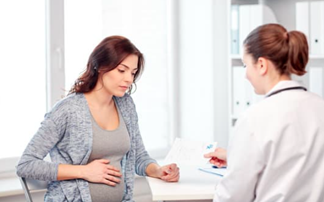 What are the biggest problems with menopause?
What are the biggest problems with menopause?
The biggest problems with menopause can include physical symptoms such as hot flashes and night sweats, as well as emotional symptoms such as mood swings and anxiety. Menopause can also increase the risk of certain health conditions such as osteoporosis and heart disease.
What is the most common side effect of menopause?
The most common side effect of menopause is hot flashes. Hot flashes are a sudden feeling of warmth that can cause sweating, flushing, and a rapid heartbeat. They can last for a few seconds to several minutes and can occur multiple times a day.
How does menopause affect a woman’s body?
Menopause can affect a woman’s body in many ways. It can cause physical symptoms such as hot flashes, night sweats, and vaginal dryness. It can also affect emotional health and mood, causing symptoms such as mood swings, anxiety, and depression. Additionally, menopause can increase the risk of certain health conditions such as osteoporosis and heart disease.
RELATED ARTICLES:
Yoga for Better Health
Cannot Get To Sleep
How To Treat Anxiety Disorders

